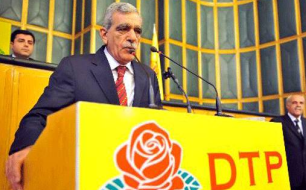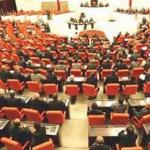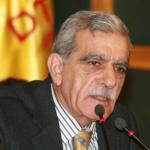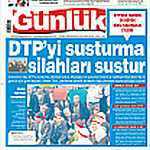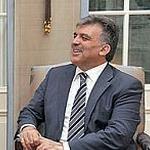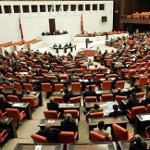When Ahmet Türk, MP and co-chair of the pro-Kurdish Democratic Society Party (DTP) addressed the MPs of his party in a party group meeting in parliament yesterday (24 February), the state channel TRT broadcasting live from parliament was ordered to halt filming.
"Not legally possible"
Immediately after the event, Parliament Speaker Köksal Toptan, announced that he had ordered the cut. In a press briefing on “using any language other than Turkish in Parliament”, he said that Article 3 of the Turkish constitution laid down that Turkish was the “official language”; in addition, so Toptan, the Law on Political Parties contained an article (Article 81) banning any other language than Turkish for party activities.
Toptan said that Türk speaking in Kurdish was a violation of the constitution and added, “it is obvious that a meeting which is carried out in a language which it is not legally possible to use cannot legally be broadcast on Parliamentarian TV.”
Toptan argued that the Parliament Speaker controls the broadcasts of the TV channel: “That is why, as soon as a language other than Turkish was spoken at the DTP group meeting, the broadcast was cut in order not to permit an act that violates the constitution and laws.”
"The beauty of languages"
Meanwhile, Ahmet Türk spoke to journalists after the group meeting, saying:
“This was a project of our group. We speak of the beauty and brotherhood of languages. Following the logic of today’s world, where languages are legitimitate and seen as an enrichment, today had to happen. Now someone will say, ‘but this in parliament…’ If you measure it like that, then women in chadors should not be able to come and visit Parliament either. We have spoken about the beauty of languages. This is an opportunity for Turkey to lift legal obstacles to languages; this is our message.”
After all, we hear it on TV and from the Prime Minister...
As for his speech in the party group meeting, Türk had said that Prime Minister Erdoğan was free to use some Kurdish at party rallies. Türk said in Turkish, “Kurdish is banned for Kurds, but it is allowed for the AKP (ruling Justice and Development Party) and the state.” He then said:
“We have no objections to Turkish being the official language of Turkey, but we want it to be understood that we are making a very humane demand, the demand that all bans on Kurdish should be lifted in the areas of local government, education, press and media and local councils.”
"Some are trying to widen the ban"
bianet spoke to Prof. Dr. Mithat Sancar, a lawyer at Ankara University. Sancar was of the opinion that Türk speaking Kurdish in a party group meeting did not violate either the constitution or the Law on Political Parties. He argued that on the contrary, those trying to widen the ban expressed in the law were violating the principle of legislative responsibility in the constitution.
The constitutional article, so Sancar, did not mean that languages apart from the official language were forbidden. If that were the case, then neither could the Prime Minister say anything in Kurdish, nor could the recently set up state TRT 6 channel broadcast in Kurdish.
He added that the speech in a party group meeting could not be counted as a formal procedure.
Freedom of expression
The academic evaluated the Law on Political Parties as “inherently problematic”. Attempts to widen a ban on Kurdish in order to extend it to group party meetings, so Sancar, represented a violation of Article 83 of the constitution. “The article gives absolute immunity to MPs to express their ideas. According to decrees by the European Court of Human Rights, freedom of expression includes the protection of the freedom to use a way of expression, different means and different languages. That is why it is wrong to invent a violation here.”
Türk’s speech, so Sancar, was very possibly a pre-election strategy to gain more votes from Kurds. Türk’s reference to the United Nations’ Day of Mother Languages on 21 February was also bound to be applauded by democratic circles.
Sancar pointed out that currently Turkey was a country where a state channel was broadcasting in Kurdish, the PM was able to use Kurdish, and the foundation of Kurdish or Kurdology departments at universities was being discussed.
TV audience has same right to access information
bianet’s project coordinator Ertuğrul Kürkçü interpreted the broadcasting interruption as a “crude intervention”. He drew attention to the public broadcasting aspect of the situation:
“If those watching the meeting in the party group room are listening to the speech, then the principles of transparency and participation dictate that citizens outside of parliament be able to access the same information. If those in the room are not forced to leave, then the broadcast cannot be interrupted.” (TK/AG)





